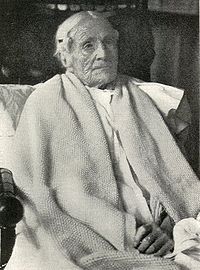
Photo from wikipedia
Autophagy is closely associated with atherosclerosis and other cardiovascular diseases (CVD). Compound Danshen prescription is widely used as a clinical antiatherosclerotic drug. In our previous studies, we have shown that… Click to show full abstract
Autophagy is closely associated with atherosclerosis and other cardiovascular diseases (CVD). Compound Danshen prescription is widely used as a clinical antiatherosclerotic drug. In our previous studies, we have shown that the combined active component, ginsenoside Rg1-notoginsenoside R1-protocatechualdehyde (RRP), can effectively alleviate endothelial dysfunction and reduce atherosclerotic plaques. However, the association between cellular senescence, caused by reduced autophagy, and atherosclerosis remains unclear. In this study, we investigated whether RRP can enhance autophagy and alleviate cell senescence through the AMPK pathway. Our results showed that RRP reduced the secretion of inflammatory factors in the serum of atherosclerotic mice, enhanced autophagy, and alleviated aortic aging in mice, thus reducing atherosclerotic plaques. In human aortic endothelial cells (HAECs), RRP effectively enhanced autophagy and inhibited senescence by activating the AMPK pathway. When AMPKα was silenced, the effect of RRP was inhibited, thus reversing its antiaging effect. Overall, our results show that RRP regulates autophagy through the AMPK pathway, thereby inhibiting cell senescence and alleviating the progression of atherosclerosis, suggesting that RRP may be a potential candidate drug for the treatment of atherosclerosis.
Journal Title: Oxidative Medicine and Cellular Longevity
Year Published: 2023
Link to full text (if available)
Share on Social Media: Sign Up to like & get
recommendations!